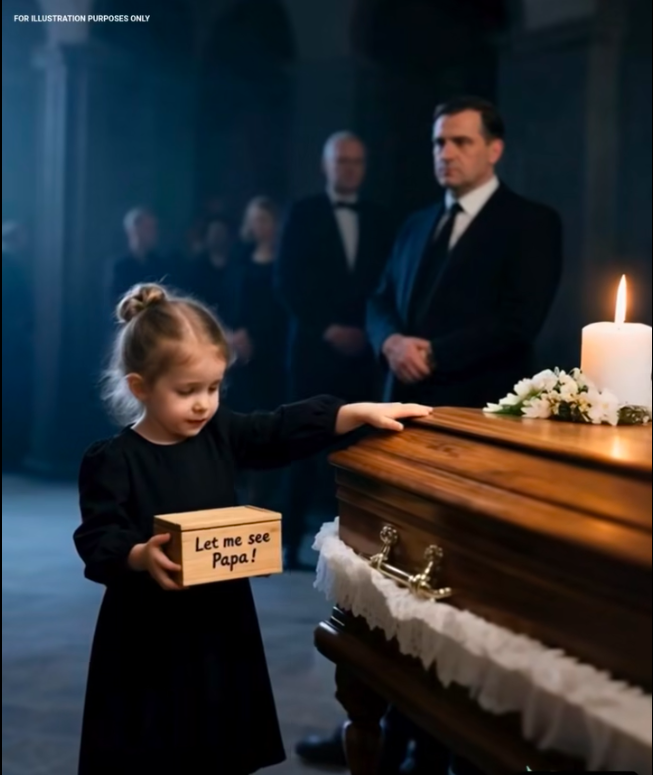The bells of St. Michael’s Church rang low and mournful. Rain tapped softly on the stained-glass windows as people filled the pews, dressed in black. At the front of the church stood a closed wooden coffin, surrounded by white lilies and flickering candles.
Clara stood beside it, holding her two-year-old daughter, Lucy, in her arms. Her face was pale, her body trembling—not from the cold, but from a grief too deep for words.
Lucy hadn’t said much all morning. She hadn’t cried like other children might. Instead, she kept pointing at the coffin.
“Papa,” she whispered again and again.
Clara, her eyes swollen and red, tried to gently lower Lucy’s hand. “Shh, darling,” she murmured, her voice a raw whisper. “Papa’s sleeping.” But Lucy was insistent, her tiny finger unwavering, pointing not just at the coffin generally, but to a specific spot on its dark, polished surface, nestled among the cascading white lilies.

A few mourners glanced their way, their expressions a mix of pity and discomfort. They wished the child would stop, allowing Clara a moment of solemn peace. Clara herself felt a pang of despair—even her daughter’s innocence seemed to mock the unbearable finality of the moment. She felt a knot in her stomach, a mixture of unyielding grief and a silent, unacknowledged tension that had settled between her and Thomas in his last few months. He had seemed distant, preoccupied, often disappearing for hours without explanation. Now, in his absence, the unanswered questions felt like heavy stones in her heart.
Lucy, however, wouldn’t be deterred. “Papa… bird,” she insisted, her voice a little louder, her eyes wide with a strange, knowing earnestness that sent a shiver down Clara’s spine.
“Bird?” Clara mumbled, confused. What bird? There were no birds on the coffin, only lilies. But Lucy’s gaze was fixed. Following her daughter’s insistent finger, Clara finally leaned closer, peering through her tear-blurred vision at the spot Lucy indicated.
And then she saw it.
Tucked almost invisibly within the dense cluster of lilies, barely peeking out from beneath a large, waxy petal, was a small, crudely carved wooden bird. It wasn’t perfect; one wing was slightly jagged, and the paint, a faded blue, was chipped in places. Clara had never seen it before in her life.
Just as a fresh wave of bewilderment washed over her, an old woman, Mrs. Gable, with kind eyes and a worn shawl, shuffled forward from the front row. Clara vaguely recognized her as a neighbor from a few streets over, someone Thomas occasionally exchanged pleasantries with.
Mrs. Gable reached out a trembling hand, gently touching the wooden bird. “This… this was Thomas’s last project for my grandson, Liam,” she said, her voice raspy with emotion. “Liam is very sick, you see, and he loves birds more than anything. Thomas… Thomas saw him one day, struggling to reach a bird feeder in his wheelchair. He started coming by every week, just to carve little birds for Liam, always promising a special one, a bluebird, when he felt stronger. He worked on this one right up until he… until he couldn’t anymore. He told me it was a secret, a surprise for Liam when he was ready. He asked me to make sure it was here, with him, if… if he didn’t finish it in time.”
The church was utterly silent. Clara stared at the wooden bird, then at the coffin, then back at the frail woman whose eyes mirrored a quiet sorrow. Thomas, her husband, had been spending his final, precious hours in secret, not in distance or preoccupation, but in a profound act of selfless kindness for a child he barely knew. The tension in Clara’s heart uncoiled, replaced by a surge of overwhelming love and a deep, aching understanding. The “distance” she had felt was his quiet, determined focus on leaving one last mark of goodness in the world.
Tears streamed down Clara’s face now, not just of sorrow, but of an immense, humbling pride. Lucy, still in her arms, reached out a tiny hand and gently touched the bird. “Papa,” she whispered again, a soft, content sigh.
The Truth: Thomas hadn’t been distant; he had been quietly dedicating his remaining strength to a hidden act of compassion. He wasn’t just a husband and a father; he was a man whose heart extended far beyond his immediate family, offering comfort and hope to those in need, even in his final days.
True love and compassion often manifest not in grand gestures or public displays, but in the quiet, unseen acts of kindness that touch lives deeply.
Sometimes, it takes the innocent eyes of a child to reveal the most profound and heart-touching truths about the silent heroes among us. The most meaningful legacies are often built on the gentle, unwavering commitment to helping others, even when no one is watching.


